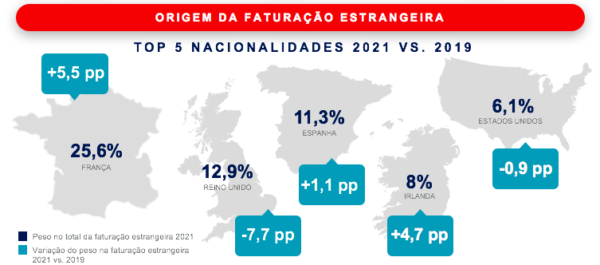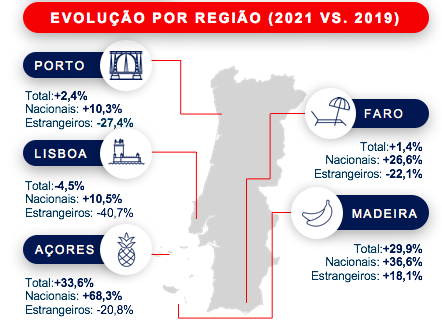
In a summer still marked by the pandemic, data from the latest transactional analysis report REDUNIQ Insights reveal that consumers have continued to bet on the contactless paymentsIn August, these accounted for 67% of the total number of transactions recorded by the REDUNIQ acceptance network.
In addition to the growing trust placed by Portuguese consumers in the contactless technologyThe report highlights the importance of domestic payment card invoicing (+16.5%), which contrasts with the 23.1% drop in foreign payment card invoicing when comparing the summer of 2021 to the same period in 2019.
We'll begin by analysing the data from the latest REDUNIQ Insights report, a document that looks at the evolution of turnover in Portugal, with a special focus on businesses in the tourism sector.
National tourists "hold on" to summer
As we've mentioned, one of the main conclusions of this latest report is the clear upward trend in invoicing from national payment cards this summer. According to REDUNIQ Insights, when comparing the summer of 2021 with the last pre-pandemic summer (2019), there was a 16.5% increase in payments originating from national cards.
This scenario is also visible in the economic activities associated with tourism - hotels, restaurants and rent-a-car - which also recorded increases in national turnover this summer compared to 2019 of, respectively, 34.8%, 84.3% and 50%.

Billing Variation (Summer 2021 Vs 2019 - 01 July to 15 September)
In the opposite direction was invoicing by foreign payment cards, which this summer continued, as last year, at a lower level than the results obtained two years ago, although this drop was less than that seen between the summer of 2020 and the summer of 2019.
When all is said and done, the balance of business this summer saw 23.1% less turnover from foreign sources compared to 2019, with the hotel, catering and rent-a-car activities earning 39.7%, 19% and 19.1% less, respectively, in this same period of comparison.
When the comparison is made between 2020 and 2019, the drops in these categories were 71.3% for hotels, 55% for restaurants, and 59.3% for rent-a-car. Although the drop in foreign turnover was significant, there were markets that ended up making a positive contribution to the turnover of national businesses.
In this regard, the highlight goes to France, Ireland and Spain, which respectively increased their contribution to the turnover of national businesses by 5.5%, 4.7% and 1.1% compared to the summer of 2019.

Origin of foreign turnover - Top 5 nationalities 2021 Vs 2019
When analysing the global ranking of countries that contributed to foreign turnover in Portugal, four European countries stand out: France (25.6% of the total), the United Kingdom (12.9% of the total), Spain (11.3% of the total), and Ireland (8% of the total). Rounding off the top five was the United States of America, with a weight of 6.11 billion euros in total foreign turnover.
Combining billing data from domestic and foreign cards, the REDUNIQ Insights report tells us that the amount collected by businesses in Portugal during the summer of 2021 was 5.5% higher than in the same period of 2019.
Azores lead the way in national tourism turnover
From the macro level to the regional level, in a transactional analysis by region, there is a similar trend of growth in national turnover and a fall in foreign turnover in the five main tourist districts: Lisbon, Porto, Faro, Madeira and the Azores.

Evolution by Region (2021 Vs 2019)
While invoicing from domestic cards exceeded 2019 figures by 68.3% in the Azores, 36.6% in Madeira, 26.6% in Faro, 10.5% in Lisbon, and 10.3% in Porto, foreign turnover showed the opposite scenario, with falls compared to the summer of 2019 of 40.71 per tonne in Lisbon, 27.41 per tonne in Porto, 22.11 per tonne in Faro, 20.81 per tonne in the Azores and 18.11 per tonne in Madeira.
According to the report, these asymmetrical results are justified by a wide range of factors.
While we can justify the increase in domestic turnover with the gradual reopening of the economy, coupled with a strong promotion of tourism in Portugal among the domestic market (just analyse the significant increase in domestic consumption in regions such as Madeira and the Azores), when it comes to the drop in foreign turnover, there is still a significant impact of the pandemic on the return of foreign consumers to our country, even though some foreign markets, such as France or Spain, have increased their turnover in Portugal this year compared to previous years.
Contactless consolidates leadership in payments
The news that contactless continues to extend its dominance in the field of payments is not exactly a new development. Since January 2020 contactless payments acquired a dimension in the total turnover of Portuguese businesses that had never been seen before, reaching 42% at the end of the year. REDUNIQ Insights report from March this yearThis percentage has since been completely vaporised.
In August of this year alone, the contactless payments accounted for 67% of the total transactions made on REDUNIQ's payment network, a figure that contrasts with the 4% of January 2019, and which proves the gradual consolidation of the contactless paymentsand even a growing adherence by the Portuguese to new ways of paying based on the use of smartphones or wearables.


